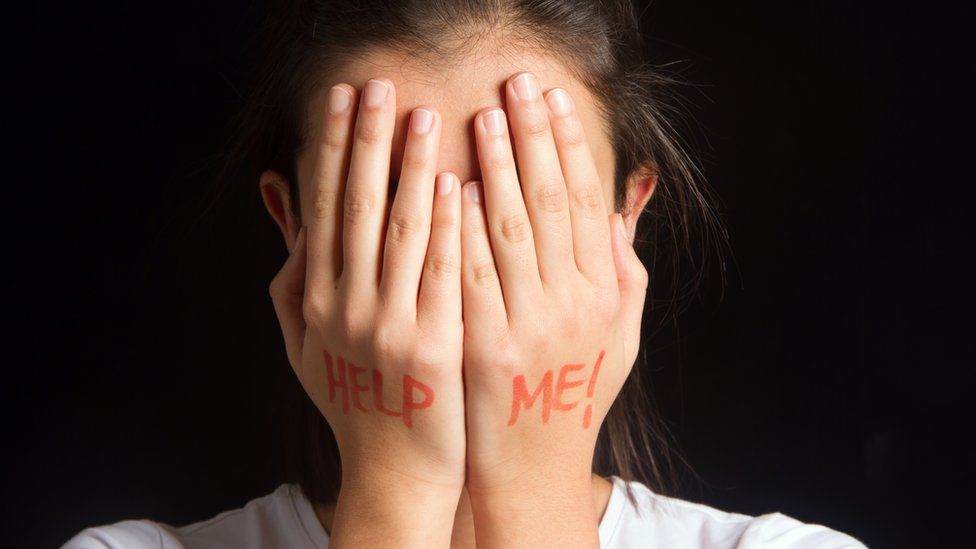Supporting the children who witness domestic violence
- Published

About one in five children in the UK has been exposed to domestic violence at home, NSPCC research has suggested, and in many instances, they go to school the next day with little or no support. One scheme is aiming to change this.
Alex - not his real name - was five years old when he saw his mother "Jane" being attacked one evening.
"I got severely beaten up, I didn't remember anything for three days," Jane says.
"I had bumps and lumps on my head like I've never seen - blood in my hair, in my ear. It was just awful.
"He'd seen me getting my hair pulled, to the point where I couldn't put my head back up.
"Out of all of the punches, and the bruising and all the torture, out of all of it, the worst part was the children seeing [what happened]."
It is in such instances that the scheme Operation Encompass aims to support children, by ensuring police communicate directly with schools to inform them that an incident of domestic abuse has happened in a child's home.
Police forces do share safeguarding information with other authorities, but often they go through social services rather than directly to schools.
Headteacher Lis Carney-Haworth, from Devon, devised the scheme after she was left in the dark about the home life of one of her pupils. The boy had been left to cope with the aftermath of a domestic violence incident without support.
"I came home from work one day absolutely furious because in school I'd had a meeting with my education welfare officer and she told me about a case of domestic abuse that had happened with one of my children five months earlier.
"I could pinpoint that incident of domestic abuse to when that child's behaviour had changed.
"He'd gone from being a perfectly happy little boy at school to being a child who came in not wanting to leave the classroom, not wanting to go to assembly, hiding under tables, running out of the classroom, then becoming violent towards us.
"This was just so ridiculous because the police had been called and nobody had bothered to tell me."
Find out more
The Victoria Derbyshire programme is broadcast on weekdays between 09:00-11:00 on BBC Two and the BBC News Channel.
Her husband, David Carney-Haworth, is a police officer and the scheme's co-founder.
"I knew that this information [on domestic abuse] was there but it wasn't something I'd had to think about, passing the information on," he explained.
"Isn't it a simple thing for me to do [as a police officer], to say to a school 'here's that information about that child'?"
The scheme is now in place across 12 UK police forces. Lis says this allows schools to provide practical, as well as emotional, help to those pupils affected.
"If they come in and they haven't got their school uniform, we can have a school uniform ready so they don't feel any different.
"If they haven't had any breakfast we can make sure they have some breakfast.
"We can actually just sit down with them and say that we know something horrible happened at home last night, and if they want to talk to us about it they can."
Sometimes it is the seemingly small gestures that can count the most, Lis adds, as was the case with Alex.
"When he arrived at school Alex brought with him a teddy bear.
"Normally when a child brings a teddy bear to school we'd say 'is mummy taking that teddy with her or shall we put it somewhere safe in the classroom', but because his class teacher knew what had happened we just let him keep it, and he hugged that teddy bear all day long.
"For us, that was absolutely nothing - but to that little boy it was everything."
Domestic abuse and children
- Around one in five children in the UK have been exposed to domestic abuse
- 62% of children in households where domestic violence is taking place are harmed directly
- Children exposed to the domestic abuse of a parent often have greater behavioural and emotional problems compared to other children, including depression and anxiety, and aggressive or anti-social behaviour
- One in five teenagers has been physically abused by their boyfriends or girlfriends
Source: NSPCC and Department for Education
Jane says that although her son's behaviour had deteriorated after witnessing violence at home, the school's early intervention made a difference.
"I could actually see him changing with what was going on in the home. I thought that was really going to damage him.
"But as soon as he became part of Operation Encompass the bad behaviour stopped, the spitting stopped and the swearing. He was getting back to that lovely little boy."
The initial behavioural changes seen in Alex are not uncommon. Children exposed to domestic violence are more likely than other children to have behavioural and emotional problems including depression and anxiety, and aggressive or anti-social behaviour.
For the founders of Operation Encompass, this reinforces the need for more police forces to work with the scheme. At present, each force decides whether it wishes to take part.
"Lots are doing this already, but lots just isn't enough," says David.
"It should be in every force, for every school, for every child - simple as that."
- Published24 December 2015